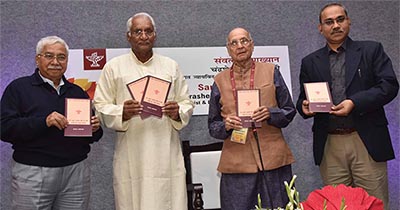|
On the occasion of completion of 62 years of its efforts to promote national heritage of languages, Sahitya Academi organized its annual ‘Festival of Letters’ at Rabindra Bhawan Complex New Delhi from 15th to 20th February 2016. The focus of the festival was celebrating oral, tribal and North-eastern literature. The high point being symposium of unwritten languages of India. Poets and writers were felicitated with the prestigious Sahitya Academy Award. The culmination of the annual festival was the Writers’ Meet on 17th February 2016. The year’s ‘Samavatsar’ lecture was delivered by Dr. C.S. Dharmadhikari, an eminent jurist and a distinguished Gandhi scholar.
Many great minds have adorned the stage and great speeches have been delivered on this occasion. Some of the eminent speakers who have delivered the Samvatsar lecture are Nirmal Verma, U. R. Ananthmurthy, A.P.J Abdul Kalam, Amitava Ghosh, Karan Singh amongst others.
The lecture session opened by felicitation of Dr. C. S. Dharmadhikari by Dr. K. Sreenivasarao, Secretary, Sahitya Akademi, New Delhi. Dr. Srinivasanrao spoke of the various attempts of Sahitya Academi to preserve and nurture the languages of India and welcomed the honourable speaker for his presence.
Dr. Dharmadhikari, who is unanimously known as ‘Jusiceji’ expressed his deepest respect for literature and literary writers. He spoke of the importance of a country’s wellbeing and the mind-set of its inhabitants as the core of any future endeavour. To build a sustainable literary culture, he believed that it should not be determined by political disposition, but as historically proven by spiritual leaders and custodians of literature. The country is divided into pieces through political, religious, communal and state boundaries. The need of the hour is to establish a boundary-less society which is the biggest challenge in today’s socio-economic scenario. The question that arose was, ‘What is national?’ If we speak of citizenship, the country is divided under four types of citizenship. Denominational citizenship where religion and communal groups get a certain right to citizenship, Hyphenated Citizenship which constitutes of people from a certain region residing in another region, Second-class citizenship that is representative of a minority who are at the mercy of the majority and Fractional citizenship which apply to women, tribals and smaller groups. Truly, who does the country belong to!
He propagated the use of Hindi language, and the respect for national language to be the first conscious choice of any citizen of the country. He further cited a situation when men of law like Rajnarayan and Ram Manohar Lohia wanted to argue in Hindi at the court, in their own country they were not allowed to argue in the country’s language; this happens to be the startling truth. The backlash of this being the agony of the common man when there is no national language to communicate the laws to him, and even his trial. Is there a complete Indian somewhere, who is beyond regional divide of thoughts, culture and language?
He spoke of modern inventions and their pros and cons and the summary of it all was that machines were created to facilitate human beings and not substitute their very core.
If we are still living within these social, political, intellectual and emotional barriers, then where is the point of convergence? It was indeed a point to delve upon and he urged the writers to express. History proves that in times of war and national catastrophe, great literature and art was born and he is hopeful of the fact that the writer’s pen would produce magic and will continue to be voice of change.
He spoke of resolution through literature and in his lecture ‘Samvatsar’ that was the soul for social change by the custodians of language and literature. He ignited their thought and laced their vision with dreams for a better and unified tomorrow, based on simple values of apathy, oneness and brotherhood.
|


Comments ({{totalComments}})
Login to post a comment...
{{comments.CommentText}}